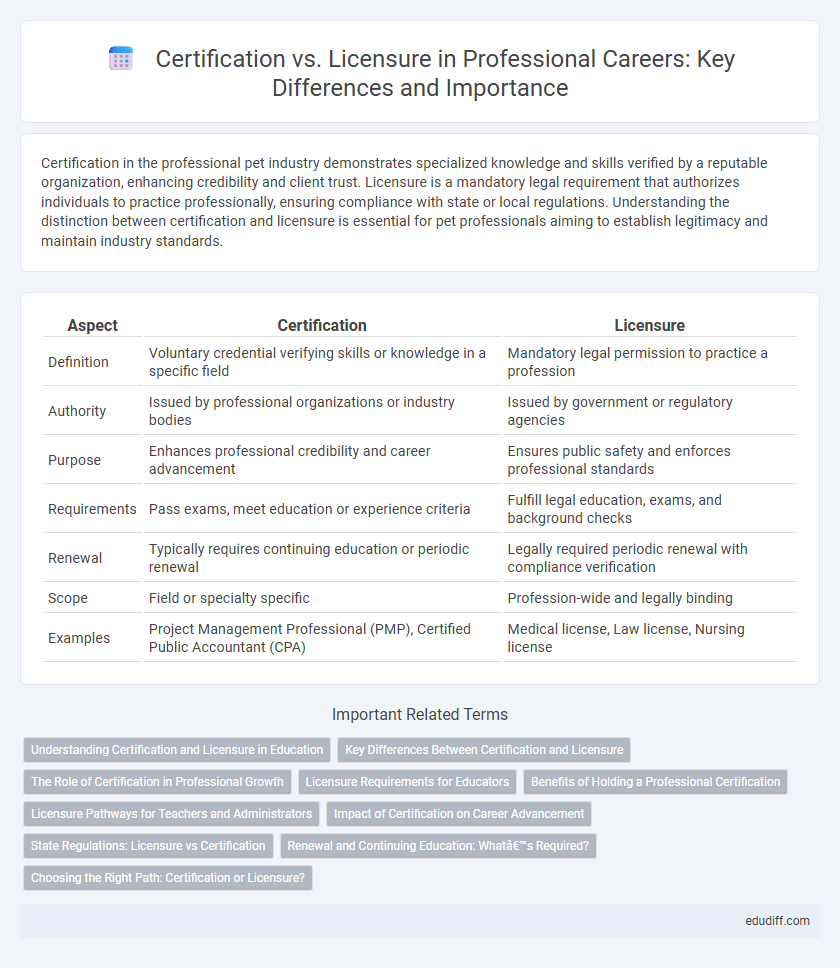Certification in the professional pet industry demonstrates specialized knowledge and skills verified by a reputable organization, enhancing credibility and client trust. Licensure is a mandatory legal requirement that authorizes individuals to practice professionally, ensuring compliance with state or local regulations. Understanding the distinction between certification and licensure is essential for pet professionals aiming to establish legitimacy and maintain industry standards.
Table of Comparison
| Aspect | Certification | Licensure |
|---|---|---|
| Definition | Voluntary credential verifying skills or knowledge in a specific field | Mandatory legal permission to practice a profession |
| Authority | Issued by professional organizations or industry bodies | Issued by government or regulatory agencies |
| Purpose | Enhances professional credibility and career advancement | Ensures public safety and enforces professional standards |
| Requirements | Pass exams, meet education or experience criteria | Fulfill legal education, exams, and background checks |
| Renewal | Typically requires continuing education or periodic renewal | Legally required periodic renewal with compliance verification |
| Scope | Field or specialty specific | Profession-wide and legally binding |
| Examples | Project Management Professional (PMP), Certified Public Accountant (CPA) | Medical license, Law license, Nursing license |
Understanding Certification and Licensure in Education
Certification in education validates a professional's specialized knowledge and skills through assessments, enabling educators to demonstrate expertise in specific subjects or teaching methodologies. Licensure is a mandatory legal requirement issued by state education boards, granting permission to practice teaching within a jurisdiction and ensuring compliance with regulatory standards. Understanding the distinction between certification and licensure helps educators navigate career advancement and maintain professional credibility.
Key Differences Between Certification and Licensure
Certification validates an individual's expertise and skills in a specific profession through voluntary assessments conducted by accredited organizations, while licensure is a mandatory government-issued permission required to legally practice certain professions. Certifications typically demonstrate proficiency and commitment to ongoing education, whereas licensure ensures compliance with legal standards, public safety, and professional accountability. The key difference lies in licensure being legally required to practice, whereas certification enhances professional credibility but is not necessarily required by law.
The Role of Certification in Professional Growth
Certification validates specific skills and knowledge, enhancing professional credibility and increasing opportunities for career advancement. It demonstrates commitment to industry standards and continuous learning, which employers often prioritize when making hiring or promotion decisions. Unlike licensure, which is legally required to practice, certification provides a competitive edge by showcasing specialized expertise and dedication to professional growth.
Licensure Requirements for Educators
Licensure requirements for educators typically include completion of a state-approved teacher preparation program, passing rigorous content and pedagogy examinations, and fulfilling supervised clinical teaching hours. States mandate ongoing professional development and renewal processes to maintain active licensure, ensuring educators remain up-to-date with current instructional strategies and standards. Unlike certification, licensure is a legal credential required to practice teaching, regulated by state education agencies to uphold educational quality and accountability.
Benefits of Holding a Professional Certification
Holding a professional certification demonstrates validated expertise and commitment to industry standards, enhancing career credibility and marketability. Certified professionals often experience higher salary potential and increased job opportunities due to recognized skills and knowledge. Employers value certifications as proof of continuous professional development and adherence to best practices in the field.
Licensure Pathways for Teachers and Administrators
Licensure pathways for teachers and administrators typically involve completing state-approved preparation programs, meeting specific educational requirements, and passing standardized exams such as the Praxis Series or state-specific tests. These pathways ensure professionals meet legal standards required to practice in public schools, contrasting with certification that often reflects specialized skills or competencies. Licensing authorities, like state education departments, oversee ongoing renewal processes requiring continuing education to maintain validity and professional standards.
Impact of Certification on Career Advancement
Certification demonstrates specialized expertise and commitment, significantly enhancing career advancement opportunities by increasing employability and earning potential. Employers often prioritize certified professionals for leadership roles and complex projects, recognizing their validated skills and up-to-date knowledge. Obtaining industry-recognized certifications can lead to faster promotions, expanded professional networks, and access to exclusive job openings.
State Regulations: Licensure vs Certification
Licensure is a mandatory approval granted by state regulatory boards, ensuring professionals meet specific standards and comply with legal requirements within that jurisdiction. Certification is a voluntary process provided by professional organizations to demonstrate expertise and competence, but it does not confer legal permission to practice. State regulations prioritize licensure as the legal credential necessary for practice, while certification enhances professional credibility without replacing licensure.
Renewal and Continuing Education: What’s Required?
Certification renewal often mandates periodic continuing education units (CEUs) to maintain professional competency, with specific hour requirements varying by certifying body. Licensure renewal typically involves meeting state board mandates, which include completing approved continuing education courses and paying renewal fees within set timeframes. Both processes emphasize ongoing professional development but differ in regulatory authority and renewal intervals.
Choosing the Right Path: Certification or Licensure?
Certification validates specialized skills and knowledge through industry-recognized exams, enhancing professional credibility in fields like IT, healthcare, and project management. Licensure, mandated by government agencies, grants legal permission to practice regulated professions such as medicine, law, and engineering, ensuring compliance with safety and ethical standards. Choosing between certification and licensure depends on career goals, industry requirements, and the necessity for legal authorization to perform specific professional duties.
Certification vs Licensure Infographic

 edudiff.com
edudiff.com